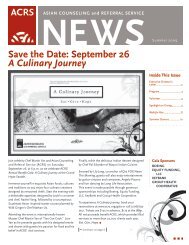updates - Asian Counseling and Referral Service
updates - Asian Counseling and Referral Service
updates - Asian Counseling and Referral Service
You also want an ePaper? Increase the reach of your titles
YUMPU automatically turns print PDFs into web optimized ePapers that Google loves.
ProgramFOCUS<br />
Assistance Gives Hope to Homeless <strong>Asian</strong> Pacific Americans<br />
Struggling with mental illness or<br />
chemical dependency is difficult<br />
enough as it is. The situation is even<br />
more stressful when one is also<br />
homeless.<br />
Homelessness <strong>and</strong> poverty affects<br />
<strong>Asian</strong> Pacific Americans more than<br />
people think. For example, 22% of the<br />
county’s Cambodian population <strong>and</strong><br />
33% of its Hmong population live<br />
below the poverty line, compared to<br />
only 8% of the total King County<br />
population. The per capita income of<br />
the county’s Vietnamese population<br />
($14,451) is half that of the overall<br />
per capita income of the entire county<br />
population ($29,521) <strong>and</strong> lower than<br />
all other minority groups. The per<br />
capita income figures are lower for<br />
Laotians ($12,307), Cambodians<br />
($10,377), <strong>and</strong> Hmong ($6,730).<br />
The City of Bellevue has awarded<br />
ACRS’ Naturalization <strong>and</strong> Immigration<br />
Assistance (NIA) Program a two-year<br />
contract of $15,098 to provide weekly<br />
citizenship classes <strong>and</strong> one-on-one<br />
assistance to immigrants living in the<br />
Eastside. Classes will be held at the<br />
King County Bellevue Regional<br />
Library, 1111 110th NE, <strong>and</strong> will use<br />
the same successful curriculum <strong>and</strong><br />
model already used in ACRS’ longrunning<br />
citizenship classes in Seattle.<br />
Bellevue is becoming home to a<br />
growing number of <strong>Asian</strong> Pacific<br />
Americans. According to Census 2000,<br />
<strong>Asian</strong> Americans make up 19% of the<br />
city’s population <strong>and</strong> 60% of <strong>Asian</strong><br />
<strong>Asian</strong> <strong>Counseling</strong> <strong>and</strong> <strong>Referral</strong><br />
<strong>Service</strong> sees how these statistics play<br />
out through the people who end up<br />
at its food bank, behavioral health <strong>and</strong><br />
substance abuse treatment programs,<br />
<strong>and</strong> recovery center. Staff say they have<br />
seen many more clients who are<br />
homeless or on the verge of becoming<br />
homeless in the past year.<br />
To help stabilize their living<br />
arrangements so they can focus on<br />
their recovery, ACRS is starting<br />
HOPES, Housing Opportunities to<br />
Encourage Self-sufficiency, through a<br />
grant totaling $675,205 for five years<br />
from King County Department of<br />
Community <strong>and</strong> Human <strong>Service</strong>s,<br />
King County Housing Authority <strong>and</strong><br />
Seattle Housing Authority. The new<br />
project, which starts in January, will<br />
allow ACRS to provide Section 8<br />
ACRS Citizenship Classes to Come to Bellevue<br />
Americans in King County are foreign<br />
born.<br />
“The citizenship classes <strong>and</strong><br />
immigration assistance we will provide<br />
will allow more Bellevue residents to<br />
improve their English <strong>and</strong> realize their<br />
dream of becoming a U.S. citizen,”<br />
said ACRS NIA Director Julia<br />
Freimund.<br />
The schedule for the Bellevue classes<br />
was not available at press time. For more<br />
information, contact ACRS NIA Program<br />
Coordinator Chip Tan at 206-695-7578<br />
or chiptan@acrs.org<br />
4<br />
housing vouchers to people dealing<br />
with mental illness <strong>and</strong>/or substance<br />
abuse.<br />
“Our clients face so many<br />
challenges,” said ACRS Behavioral<br />
Director Yoon Joo Han. “They are often<br />
shunned by their families because of<br />
their mental illness or addiction, so<br />
they don’t have a place to call home.<br />
They are hospitalized or jailed as a<br />
result of their mental illness symptoms,<br />
<strong>and</strong> often lose their housing <strong>and</strong> public<br />
health benefits. This affects their credit<br />
rating <strong>and</strong> rental history, making it<br />
harder for them to find affordable<br />
housing once they are released. It is<br />
such a terrible cycle. HOPES will help<br />
them break that cycle so they stabilize<br />
their lives.”



